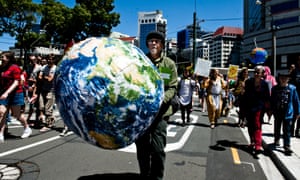Extract from The Guardian
Heat proves no obstacle to the reported 15,000
demonstrators in Auckland, or the 5,000 in Brisbane, following a
40,0000-strong Melbourne event on Friday
A man holding a large blow up globe participates
in the march on New Zealand parliament in Wellington on Saturday to
call for more action on climate change. Photograph: Olexander
Barnes/Demotix/Corbis
Guardian staff and agencies
Saturday 28 November 2015 17.43 AEDT
An estimated 5,000 people have marched in Brisbane
and more were planning to march in Darwin on Saturday, following
Friday’s 40,000-strong
rally in Melbourne.
The People’s Climate March – a worldwide event
– took place on Saturday, and organisers said thousands took part
in 35 New
Zealand centres – the smallest being on Raoul Island, where the
island’s entire population of seven turned out.
The Brisbane
march was plagued by hot, humid weather, but those rallying to call
for urgent action on climate change in the lead-up to the Paris
climate talks next week seemed undeterred.
The
ABC reported the 5,000-strong crowd gathered at Queen’s Park
before marching through the CBD and across the river to South Bank.
The Pacific Climate group addressed demonstrators about the risk of
catastrophic sea level rises.
Rallies are planned in Adelaide, Canberra, Sydney,
Hobart and Perth on Sunday.
Before the Brisbane march, thousands had also
gathered in Wellington, Auckland and Christchurch
in New Zealand.
A reported 15,000 marched in Auckland
– although some media outlets put the figure as low as 4,000 –
8,000 in Christchurch and 7,000 marched on NZ parliament in
Wellington, according to media reports.
Climate activist and actress Lucy Lawless
addressed the Auckland event.
Altogether, 30 marches were scheduled across New
Zealand for the weekend.
March organiser Steve Abel told
the New Zealand Herald that collectively, it was by far the
biggest climate change march to be held in New Zealand.
“Instead of seizing the opportunities from
moving to a low-carbon future, the New Zealand government is lagging
behind its people and the world by taking a weak target to Paris and
refusing to take real action on climate change,” Auckland march
convenor Kristin Gilles told AAP.
New Zealand is taking a target of reducing
greenhouse gas emissions to 30% below 2005 levels by 2030 to the
Paris talks.
“The government should listen to the thousands
of New Zealanders who took to the streets today and come up with a
stronger, more ambitious plan for reducing climate pollution,” said
co-leader James Shaw.
However, the prime minister, John Key, has said
the 30% reduction is credible.
Australian Associated Press contributed to
this report.

No comments:
Post a Comment